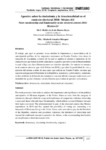
Please use this identifier to cite or link to this item:
http://ricaxcan.uaz.edu.mx/jspui/handle/20.500.11845/1021Full metadata record
| DC Field | Value | Language |
|---|---|---|
| dc.contributor | 45747 | es_ES |
| dc.contributor.other | https://orcid.org/0000-0002-8778-9504 | - |
| dc.creator | Ibarra Reyes, Rubén de Jesús | - |
| dc.date.accessioned | 2019-05-27T18:12:57Z | - |
| dc.date.available | 2019-05-27T18:12:57Z | - |
| dc.date.issued | 2018-10 | - |
| dc.identifier | info:eu-repo/semantics/publishedVersion | es_ES |
| dc.identifier.issn | 2227-6513 | es_ES |
| dc.identifier.uri | http://ricaxcan.uaz.edu.mx/jspui/handle/20.500.11845/1021 | - |
| dc.identifier.uri | https://doi.org/10.48779/6q96-xc03 | - |
| dc.description | The work presented here seeks to analyze the importance and significance of the political participation of Mexican migrants in the United States as seen from the category of citizenship, through which the scope and interference of compatriots with dual citizenship is analyzed. those who only have binationality, which reflects a clear difference between their rights exercised. The aforementioned is part of the electoral context that Mexico experienced in 2018 and that opened the possibility of voting and exercising it to thousands of Mexicans living in the United States, who were able to pay for the President of the Republic, senators and governors. Likewise, the definition of citizenship seen beyond the traditional concept is opened to the debate, in the understanding that borders are insufficient to limit the exercise of it. | es_ES |
| dc.description.abstract | El trabajo que aquí se presenta busca abordar la importancia y trascendencia de la participación política de los migrantes mexicanos en Estados Unidos vista desde la categoría de ciudadanía, a través de la cual se analiza el alcance e injerencia de los connacionales que tienen la doble ciudadanía y aquellos que sólo tienen la binacionalidad, lo cual refleja una clara diferencia entre sus derechos ejercidos. Lo anterior se enmarca en el contexto electoral que vivió México en 2018 y que abrió la posibilidad de voto y ejercicio del mismo a miles de mexicanos que radican en Estados Unidos, mismos que lograron sufragar por el Presidente de la República, senadores y gobernadores. Asimismo, se abre al debate la definición de ciudadanía vista más allá del concepto tradicional, en el entendido de que las fronteras son insuficientes para limitar el ejercicio de la misma. | es_ES |
| dc.language.iso | spa | es_ES |
| dc.publisher | Universidad de Oriente | es_ES |
| dc.relation | https://revistas.uo.edu.cu/index.php/stgo/article/download/4612/3970 | es_ES |
| dc.relation.uri | generalPublic | es_ES |
| dc.rights | Atribución-NoComercial-CompartirIgual 3.0 Estados Unidos de América | * |
| dc.rights.uri | http://creativecommons.org/licenses/by-nc-sa/3.0/us/ | * |
| dc.source | Revista Santiago Sociología y Universidad, octubre 2018 | es_ES |
| dc.subject.classification | CIENCIAS SOCIALES [5] | es_ES |
| dc.subject.other | democracia | es_ES |
| dc.subject.other | ciudadanía | es_ES |
| dc.subject.other | binacionalidad | es_ES |
| dc.subject.other | migrantes | es_ES |
| dc.subject.other | democracy | es_ES |
| dc.subject.other | citizenship | es_ES |
| dc.subject.other | binationality | es_ES |
| dc.subject.other | migrants | es_ES |
| dc.title | Apuntes sobre la ciudadanía y la binacionalidad en el contexto electoral 2018: México-EU | es_ES |
| dc.title.alternative | Notes oncitizenship and binationality in the electoral context 2018: Mexico-EU | es_ES |
| dc.type | info:eu-repo/semantics/article | es_ES |
| Appears in Collections: | *Documentos Académicos*-- UA Ciencias Sociales | |
Files in This Item:
| File | Description | Size | Format | |
|---|---|---|---|---|
| Apuntes sobre ciudadania.pdf | 497,29 kB | Adobe PDF |  View/Open |
This item is licensed under a Creative Commons License
